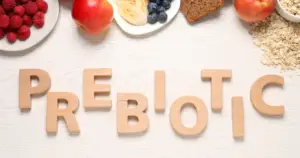8 Benefits of Prenatal Vitamins for Pregnant women

Pregnancy is one of the most beautiful and sensitive phases in the life of a woman. Her body demands a lot from her, especially in terms of nutrition.
While the food chart helps you manage your macronutrients, you need to take care of micronutrients as well. (Vitamins and Minerals) But complete dependence on diet may not satisfy prenatal requirements. So we turn to the benefits of prenatal vitamins.
The importance of these vitamins cannot be stressed enough. It fills the gap between nutrients. It makes sure that the baby has all the nutrition for its development, especially folate, vitamin B, vitamin C, magnesium, calcium, and zinc.
Benefits of prenatal vitamins
For the baby
- Prenatal vitamins reduce the probability of preterm birth.
- It helps in resolving birth anomalies(if any) during pregnancy.
- It aids in brain and spine development. (Folate)
- It reduces the chances of Autism before childbirth. (Folic acid)

For the mother
- Prenatal vitamins help in steady weight gain.
- It reduces symptoms of morning sickness and nausea throughout pregnancy.
- It also lowers the risk of anemia and other vitamin deficiencies, both during and after pregnancy.
- It reduces hair loss and takes care of dry skin and stretch marks.
When should one start taking vitamins?
Mothers should take prenatal vitamin pills at least a month before, and during pregnancy. It is also important to make sure that the child receives the prenatal vitamin benefits until breastfeeding.
List of vitamins to be consumed during pregnancy
- Folic acid – supports the baby’s spine and brain development.
- Vitamin D – reduces the risk of preterm delivery and proper growth of the baby.
- Calcium – helps mothers maintain bone strength. It also helps in the development of bones and teeth in the baby. Calcium consumption is critical because foetal calcium absorption is limited.
- Iron – helps in haemoglobin level maintenance in the mother and increases blood volume supply to the baby.
- Omega 3 fatty acids – ensures brain and eye development of the baby.
- Vitamin A – helps in eye, skin and hair development of the baby.
- Vitamin C – aids in the growth of gums, teeth, and bones.
- Vitamin B6 – helps in developing red blood cells, both in the mother and the baby.
Foods to be consumed with supplements
- Folic acid: fortified cereals, grains, green leafy vegetables
- Iron: red meat, dried beans, fortified cereals
- Vitamin D: egg yolk, salmon, cod liver oil
- Calcium: milk, cheese, yoghurt
- Omega-3 fatty acids: tilapia, salmon, shrimp.
Diet plays a vital role during pregnancy. Always nourish your baby with an adequate amount of supplements. Stay in touch with your doctor and nutritionist for constant support and advise.
Side effects of prenatal vitamins
Despite a number of prenatal vitamin benefits, there are a few disadvantages. Through urine, excess vitamins pass out of the body. It leads to frequent urination which may cause discomfort.
Excess intake of iron medication can be toxic. It may either lead to skin discolouration in babies or cause severe constipation to the mother. Hence a doctor’s supervision is advised.1
To wrap up
Though diet plays a vital role in the healthy development of the child it might not be enough. To avoid nutritional gaps and for the proper nourishment of the kid, consider taking prenatal supplements.
What next?
Wish to create a healthy body?
Learn the essential components of a holistic health plan and get better. Most of these suggestions work for pregnant women too.
You can also learn about the best vitamins for healthy teeth.
Frequently Asked Questions(FAQs)
1. Can taking prenatal vitamins change your menstrual cycle?
Prenatal vitamins don’t affect the menstrual cycle. In fact, the menstrual cycle regularizes due to pre-natal vitamins(in a few cases). Vitamins help in body’s macro-nutrient absorption and provide total benefits of the supplement.
2. When to start taking prenatal vitamins?
One can start taking prenatal vitamins 3 months before conception. Prenatal vitamins regularize the menstrual cycle and protect the thyroid hormone. According to research, when a body fails to absorb vitamins, poly-cystic ovaries (irregular or prolonged menstrual periods) tend to appear due to stress.
By taking prenatal vitamins, thyroid symptoms and PCOD are brought under control. This eases the pregnancy process.
3. How long after taking prenatal vitamins can you get pregnant?
It depends on one’s body nature and absorption levels. Pre-natal vitamin consumption doesn’t guarantee pregnancy, but these vitamins speed up the process.
4. When is the best time to take prenatal vitamins?
One can take prenatal vitamins after breakfast and dinner. However, it depends on the dosage too. For example, if the calcium supplement is 1000mg, then one supplement a day is sufficient. But if your Iron supplement is 45mg, one must take it after breakfast and dinner. Also, drink lots of water and consult a health professional before taking any supplements.
References
- Pregnancy and birth: Do all pregnant women need to take iron supplements? – Although our bodies can store a certain amount of extra iron, higher-dose iron supplements may cause side effects. These include, in particular, gastrointestinal (stomach and bowel) problems like constipation, nausea, vomiting and diarrhea.
![Blue Foods List [with pictures]](https://keevs.com/wp-content/uploads/2023/03/Blue-Foods-List-with-pictures-300x158.png)






